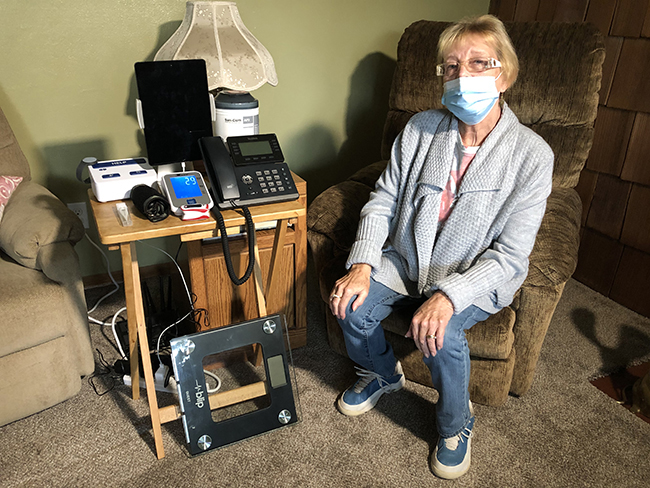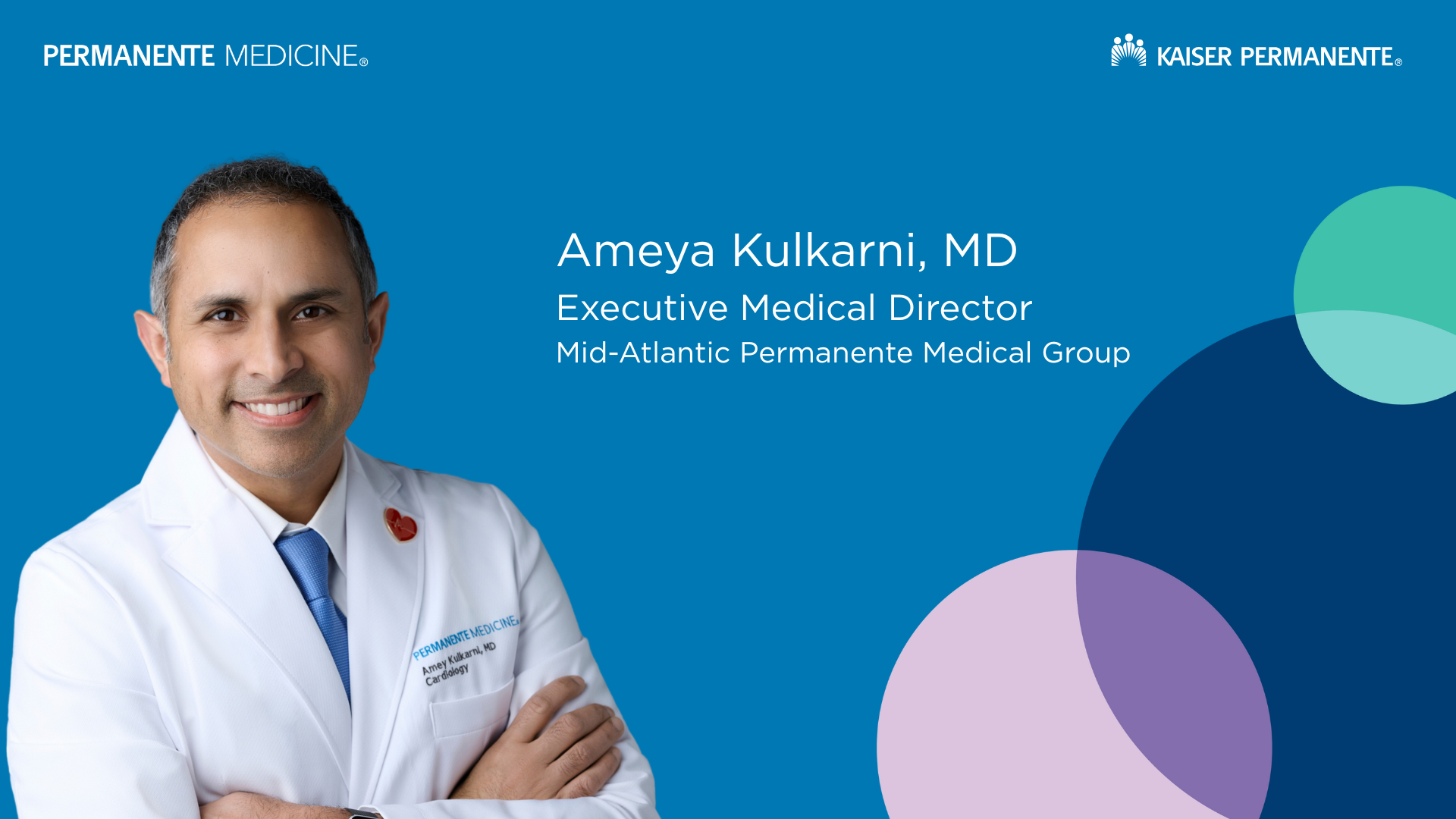Dr. Ameya Kulkarni now leads one of the largest multispecialty medical groups in the East Coast.

Expanding access to hospital care at home
Kaiser Permanente, Mayo Clinic announce investment in Medically Home
Rochester, Minn., and Oakland, Calif. ― Kaiser Permanente and Mayo Clinic are partnering in an unprecedented collaboration to allow more patients to receive acute level of care and recovery services in the comfort, convenience, and safety of their homes.
Beginning with significant strategic investments in Medically Home Group, a Boston-based, technology-enabled services company, Mayo Clinic and Kaiser Permanente seek to expand access to this unique model and encourage health systems and care providers to adopt it. By building capacity to meet rapidly increasing demand while addressing regulatory and legislative barriers, the partnership will allow more patients across the United States to safely receive high-quality acute and restorative care in their homes.
Medically Home’s one-of-a-kind technology and services platform enables providers to address a significant range of clinical conditions at the higher end of the clinical acuity spectrum that are typically treated in traditional hospital settings, safely in a patient’s home. This includes routine infections and chronic disease exacerbation, emergency medicine, cancer care, acute level of COVID-19 care, and transfusions. During the COVID-19 pandemic, use of this model helped combat patient isolation and loneliness, allowing family members to be at the patient’s bedside at home, while helping hospitals balance the increased demands for hospital beds.
Key features of Medically Home’s virtual and physical care delivery model include a 24/7 medical command center staffed by an array of clinicians and an integrated care team in the community who deliver care to patients at their bedside. This turnkey, purpose-built care delivery chassis that integrates with the patient’s electronic health record, provides elements that include:
- Required protocols for high-acuity care in the home.
- Rapid response logistics systems and providers of care in the home.
- Integrated communication, monitoring and safety system technology in the home.
- The necessary software platform, the Cesia® Continuum, for orchestrating high-acuity care in patients’ homes.
One of the demonstrated positive results is that patients hospitalized using the Medically Home model have a lower need for recurring hospitalization at 30 and 90 days following a care episode.
“Patients expect and deserve high-quality care and excellent outcomes in a convenient and comfortable setting, even when faced with complex medical challenges,” says Gianrico Farrugia, MD, president and CEO of Mayo Clinic. “Our partnership with Kaiser Permanente and Medically Home will create the next generation of patient-centric, compassionate health care that seamlessly integrates advanced technology with clinical expertise. By bringing best-in-class clinicians and services to patients in their homes, we’ll be able to provide more people with individualized care that’s tailored to meet their specific needs.”
Both Mayo Clinic and Kaiser Permanente are successfully using Medically Home’s scalable care delivery model today for their patients, and the number of patients cared for using this model continues to grow.
The broad spectrum of clinical applications that can be addressed with this model unlocks an additional site of care ― a patient’s home ― increasing health system capacity and resiliency, while meeting the needs and wants of patients who prefer to be cared for at home or at a homelike setting.
“This partnership is a significant step in our commitment to providing the right care in the right setting for every patient as we continue to help lead the transformation of health care,” says Greg A. Adams, chair and CEO of Kaiser Foundation Health Plan Inc. and Hospitals. “While the pandemic has put a spotlight on the limitations of brick-and-mortar health care delivery, this important expansion of Medically Home’s resources will help fill a critical need going forward.”
In addition, nonprofit organizations, such as Adventist Health, ProMedica and UNC Health, use Medically Home’s model of care. Medically Home also partners with Massachusetts General Hospital Cancer Center in their randomized clinical trial of supportive oncology care in the home. The group is also working with partners including Huron and Cardinal Health. Medically Home estimates that 30% of hospitalized patients can benefit from the model.
Mayo Clinic launched its advanced care at home program last summer at Mayo Clinic in Florida and Mayo Clinic Health System in Eau Claire, Wisconsin, to deliver complex, comprehensive care and restorative services to qualifying patients in their homes. These services, which are provided in person and virtually, include:
- Infusions.
- Skilled nursing.
- Medication delivery.
- Laboratory and imaging services.
- Behavioral health.
- Rehabilitation services.
Care is delivered by a network of community paramedics and nurses, and a team under Mayo Clinic’s clinical direction.
Kaiser Permanente launched its hospital care at home program in two regions last year, admitting patients from multiple hospitals across both its Northern California and Oregon locations. In this model, Kaiser Permanente has a single medical command center in each region supporting multiple hospitals to care for patients longitudinally across their acute and restorative phases.
“Mayo Clinic and Kaiser Permanente partnering with Medically Home to lead the transformation of the delivery of health care is a watershed moment for our national health systems,” says Raphael Rakowski, executive chairman of Medically Home. “The democratization of the finest medical care also has the potential to close gaps in underserved, rural areas at home and globally.”
The combination of patient demand for consumer-centered models and technology-driven innovations, the need for flexible capacity within hospitals as well as the regulations allowing nonhospital space to be used for patient care during the COVID-19 emergency gave rise to telemedicine services, including offering hospital care in the home setting.
“Rarely in the history of medicine do we see such a perfect alignment of policy, technology and cultural transformation converging to produce a new care paradigm like acute care at home,” says John Halamka, MD, president of Mayo Clinic Platform. “We can advance the well-being of patients by catalyzing innovative, collaborative, knowledge-driven platform business models to redefine the standard of high-acuity care for patients with serious or complex illnesses who currently receive care in hospitals.”
“Increasingly, the future of health care will be outside the four walls of the hospital. Treating patients in their home allows physicians to treat the whole patient. We see their individual needs and can integrate critical information, such as diet, physical environments and social determinants of health, into their care plans,” says Stephen Parodi, MD, executive vice president of The Permanente Federation.
“The work we have done to date with Mayo Clinic, Kaiser Permanente and our other customers validates the importance of rigorous, seamless, integrated implementation and orchestration of this high-acuity platform on behalf of patients and their families,” says Rami Karjian, CEO of Medically Home. “We believe all health systems globally should have access to serious and complex care through this unique platform. This partnership with Mayo Clinic, Kaiser Permanente and others will catalyze, enable and accelerate our high-acuity model becoming the standard of care for patients everywhere.”
This originally appeared on the AboutKP site.


